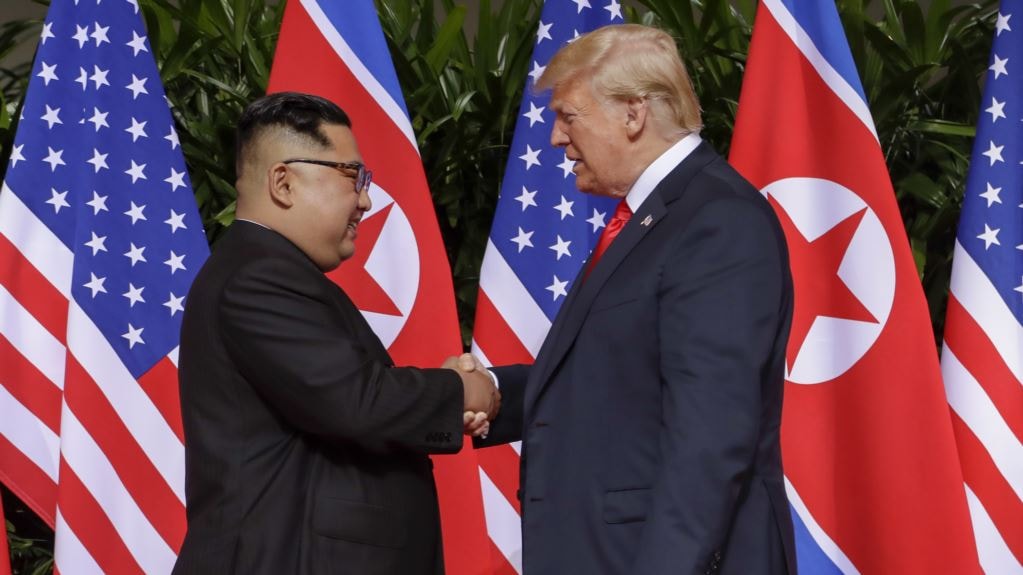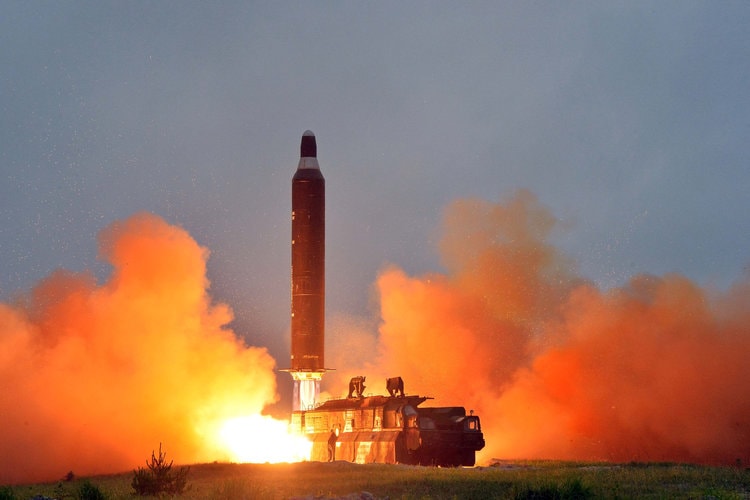Thanks to Trump, North Korea's "divide and rule" strategy is more effective
(Baonghean.vn) - US Secretary of State Mike Pompeo's "disastrous" trip to North Korea forced the US to struggle to find ways to ensure influence in dealing with North Korea and even in its relationship with South Korea.
 |
| President Trump made too many concessions during his summit with Kim Jong-un in Singapore on June 12. Photo: AP |
The US is struggling to manage its relationship with long-time ally South Korea, after Seoul stressed the need for “close consultation” with North Korea, not just with the US as in the past.
It is clear that North Korea, far from giving Pompeo what he expected, has deepened the rift between Seoul and Washington. The show of unity between Secretary Pompeo and his South Korean and Japanese counterparts cannot hide this reality.
Following Secretary Pompeo's visit, the North Korean Foreign Ministry was quick to criticize the US's "unilateral and thuggish demands for denuclearization."
Pyongyang also accused the Trump administration of ignoring calls for a “peace mechanism” and “declaring an end to the (Korean) war,” goals that the Seoul government is also aiming for.
South Korea has put the US and North Korea on equal footing.
 |
| Public opinion is skeptical about North Korea's goal of denuclearization. Photo: Getty |
Meanwhile, President Moon Jae-in's spokesman pledged that Seoul would "closely consult with the United States and North Korea for the goal of complete denuclearization of the Korean Peninsula and the establishment of peace." What the public paid attention to was that in this statement, South Korea placed the United States and North Korea on equal footing.
President Moon's spokesman also said that the talks "are the first steps on the journey" toward the set goal if "the parties continue dialogue with strong trust".
The statement contrasted with what Pompeo said in Tokyo after he, South Korean Foreign Minister Kang Kyung-wha and Japanese Foreign Minister Taro Kono shook hands in a group photo and insisted that UN sanctions imposed after North Korea's nuclear and long-range missile tests would remain in place.
In his first comments on North Korea’s aggressive stance, Secretary Pompeo said that if the “demands” he made during the meeting were “thugs,” then “the whole world is thugs, because the UN Security Council has agreed on the goal to be achieved.” However, the reality is that there is no consensus among the allies while the situation is said to be very fluid.
Choi Jin-wook, former director of the Korean Institute for National Unification, commented: “The US wants to cooperate closely with South Korea, but the pace of inter-Korean reconciliation could undermine US influence.” The key issue clearly lies in the nature of the demands that North Korea has raised.
“Declaring an end to the war should be the first step in easing tensions and establishing peace on the Korean Peninsula, and the first step in building trust between the DPRK (Democratic People’s Republic of Korea) and the United States,” the country’s statement said.
However, the US views North Korea's demand to replace the ceasefire with a peace treaty as an attempt to end the US-South Korea alliance, leading to the US having to disarm part, if not all, of the 28,500 US troops stationed in South Korea.
Whether by accident or design, the new US Ambassador to South Korea Harry Harris, who once commanded US forces in the Pacific and is known for his hardline views, quickly traveled to South Korea after Secretary of State Pompeo left Pyongyang for Tokyo.
Mr. Harris later issued a statement affirming that “President Trump and the administration have made clear that strengthening the alliance with the Republic of Korea is one of our top priorities,” and that President Trump and President Moon Jae-in of South Korea will “work together to persuade Pyongyang to change course.”
America gives too much concession to North Korea
Shim Jae-hoon, a senior writer for the Far Eastern Economic Review and the Yale Global website, said Harris's statement was intended to reaffirm the US's stance toward President Moon and the liberal government in Seoul.
However, this commentator believes that President Trump made too many concessions during the summit with Kim Jong-un in Singapore on June 12.
“He lost a very valuable opportunity to achieve the goal of complete, verifiable, and irreversible denuclearization of the Korean Peninsula. Things have only gotten worse since then,” Mr. Shim commented.
It is believed that Secretary of State Pompeo's trip actually had significant results when he convinced the North Korean side to agree to hold a meeting at the Panmunjom truce village on July 12 to discuss the repatriation of the remains of American soldiers killed in the Korean War.
Two weeks ago, President Trump said that about 200 sets of remains had been returned to the US, but in reality, no such developments have taken place. The US has moved wooden coffins to Panmunjom in preparation for this work.
Many expect North Korea to begin the transfer of the remains on July 27, the 65th anniversary of the armistice on the Korean Peninsula.
However, some people cannot help but doubt that North Korea is using this sensitive issue as "bait" to lure the US into making an official declaration to end the Korean War, while still leaving the nuclear issue open.

